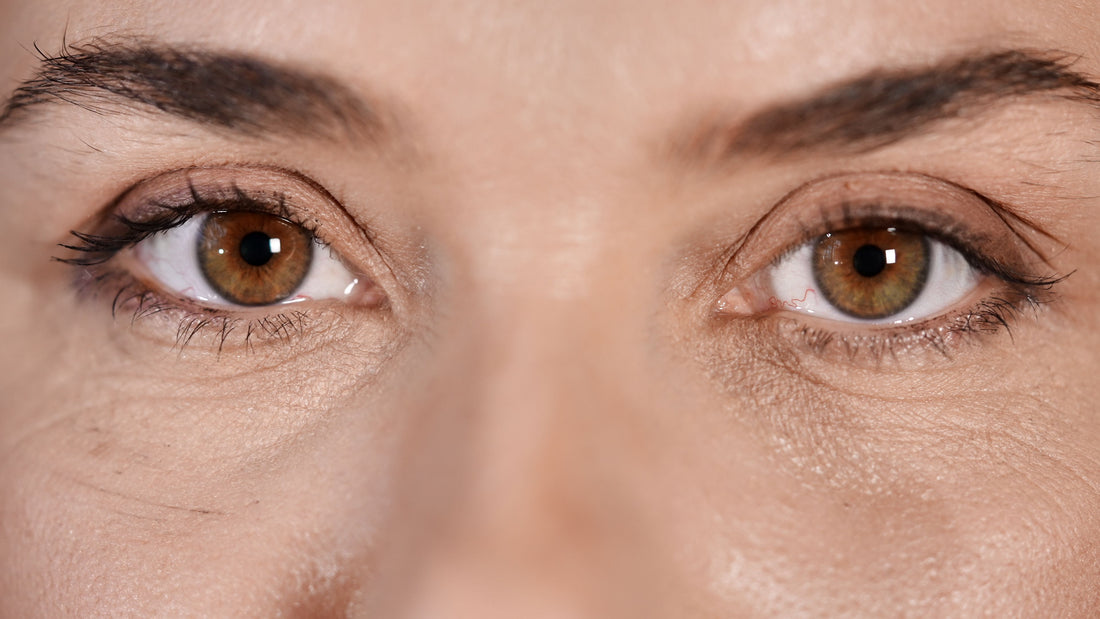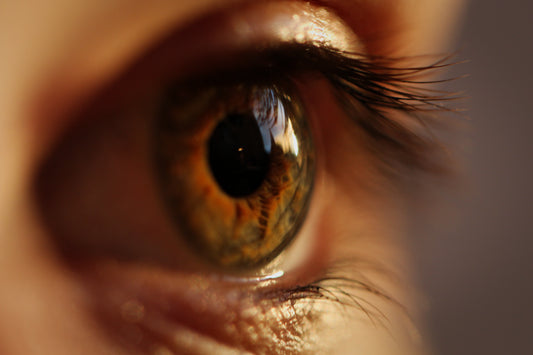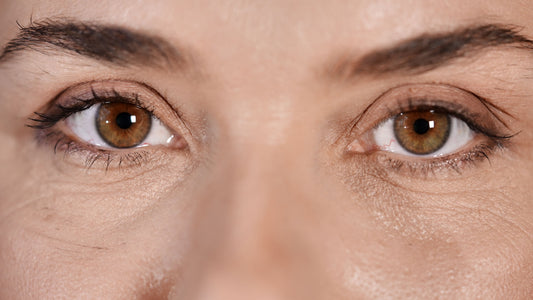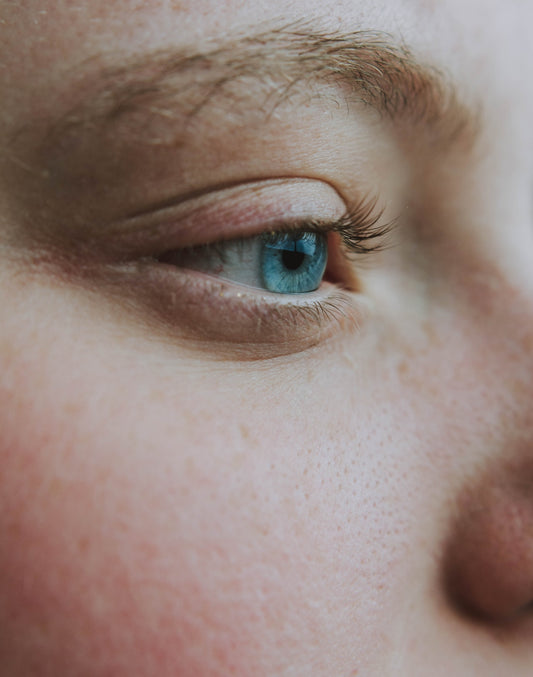Have you ever looked in the mirror and wished your eyelashes were fuller and thicker? Maybe you’ve tried every mascara on the market or even considered fake lashes, but still aren’t satisfied. The truth is, there are many reasons why some of us have sparse lashes while others seem to have been blessed with luscious ones.
One factor that can influence eyelash density is genetics. Just like hair texture and color, eyelash thickness and length can be inherited from your parents. If someone in your family has thin lashes, it’s possible that you may as well. While we can’t change our genes, understanding the role they play in our appearance can help us better accept and appreciate our natural features.
Another culprit behind sparse lash lines is aging. As we get older, our hair follicles – including those on our eyelids – gradually produce fewer hairs. This means that not only do our lashes become thinner and less numerous over time, but they also start to grow more slowly. Additionally, the skin around our eyes becomes thinner as we age, which can make eyelashes appear even sparser.
It’s not just biological factors that affect eyelash health though – lifestyle choices can also play a role. Stress and sleep deprivation are two culprits that are often overlooked when it comes to lash health. When we’re stressed or tired, our bodies produce more cortisol (the stress hormone), which can interfere with hair growth by sending testosterone levels out of balance. In turn, this can lead to weaker lashes or even cause them to fall out altogether.
Decoding Sparse Eyelashes: A Closer Look at the Causes
When it comes to eyelashes, it's safe to say that we all want them thick, long, and luscious. However, not everyone is blessed with such eyelashes. For some of us, our lashes are naturally thin and sparse.
But why is this so? Let's take a closer look at some of the causes of sparse eyelashes.
First up, genetics. Just like how some people are born with curly hair while others have straight hair, our genes play a role in determining the thickness and length of our lashes. Some people inherit genes that make their lashes naturally thin and fragile.
Age is another factor that contributes to sparse eyelashes. As we age, our hair follicles gradually shrink in size and produce thinner hair strands. This applies to the hair on your head as well as your eyelashes.
Stress and sleep deprivation can also impact the health of your lashes. When we're stressed or not getting enough sleep, our bodies go into survival mode where they prioritize essential functions over less important ones like growing new hair follicles. As a result, eyelash growth may slow down or even stop altogether. So if you want healthy lashes, make sure you're getting enough rest and managing your stress levels!
There are many factors that contribute to sparse eyelashes including genetics, aging, stress/sleep deprivation, nutritional deficiencies (which we'll touch on later), medical conditions, and beauty treatments gone wrong! The good news is that there are plenty of tips and treatments available for improving lash density- which we'll explore later on in this article!
Genetic Factors in Sparse Eyelashes
There are many causes of sparse eyelashes, and one major factor that cannot be ignored is genetics. Your eyelash length, thickness, and overall density are influenced by your DNA. So if your parents have naturally thin lashes, chances are you will too.
However, just because genetics play a role in the appearance of your lashes doesn't mean there's nothing you can do to improve them. While you may not be able to change the basic structure of your lashes, there are plenty of ways to boost their health and make them look fuller.
For example, incorporating certain vitamins and minerals into your diet can nourish hair follicles and promote lash growth. It's also important to note that genetic factors aren't the only cause of sparse lashes. Other contributing factors such as stress, sleep deprivation, and certain medical conditions can all impact eyelash health as well. That said, if you've always had thin or sparse lashes despite taking good care of them with a healthy lifestyle and proper grooming habits, then genetics may very well be at play.
The Impact of Aging on Eyelash Density
As we age, it's natural to experience changes in our eyelash density. This process is often gradual, but can sometimes be more sudden, leaving us feeling self-conscious and searching for solutions. While there's no getting around the fact that our lashes will thin out over time, there are some things we can do to slow down the process and make the most of what we've got.
One of the main ways that aging impacts our eyelash density is through hormonal changes. As we get older, our bodies produce less and less estrogen, which can lead to hair loss all over our bodies - including on our lashes. This is why many women notice a significant change in their lash thickness during menopause or perimenopause.
Another way that aging affects our lashes is through physical changes to the hair follicles themselves. Over time, these follicles can become damaged or weakened, which makes it harder for new lashes to grow in and maintain their strength. This also means that even if you're doing all the right things (like eating a healthy diet and avoiding harsh beauty treatments), your lashes may still thin out as you get older.
So what can you do to combat these effects of aging on your eyelashes?
One key strategy is to take care of your overall health as much as possible. This means eating a balanced diet with plenty of vitamins and minerals (especially iron), exercising regularly, getting enough sleep, and managing stress levels effectively. You may also want to try using lash growth serums or other topical treatments designed specifically for this purpose - just be sure to do your research before investing in any particular product!
How Stress and Sleep Deprivation Contribute to Sparse Lashes
Stress and sleep deprivation are two of the most significant factors that contribute to sparse eyelashes. Stress triggers a chemical cascade in the body that can lead to hair loss, including lash shedding. The more stress you experience, the more likely you are to lose lashes and have sparse lash growth.
Sleep deprivation also has a similar effect on lashes, as it disrupts the body's natural hair growth cycles and leads to thinner, weaker lashes in the long term. To fully understand why stress affects our eyelashes, we need to dive deeper into the science behind it.
When we're stressed, our bodies release a hormone called cortisol as part of our "fight or flight" response. Cortisol is known for its role in regulating stress levels but can also have negative effects on hair growth by reducing blood flow to hair follicles and increasing inflammation.
This means that when cortisol levels are high for an extended period, like during chronic stress, it can damage hair follicles and result in thinner lashes. Sleep deprivation can also lead to sparse eyelashes because it disrupts our body's natural circadian rhythms.
In particular, a lack of sleep can interfere with the production of melatonin, which regulates many physiological processes including hair growth that occur while we're asleep at night. Without enough melatonin production during these critical hours, our lashes may not be able to regenerate properly or grow as full as they could be otherwise.
If you're experiencing sparse eyelashes due to stress or sleep deprivation—two factors that often go hand-in-hand then taking steps to reduce your stress levels and improve your sleep hygiene may be helpful for restoring your lash density over time. Simple changes like practicing relaxation techniques before bed or establishing a consistent bedtime routine can go a long way toward improving your sleep quality and protecting your precious eyelash strands from unnecessary damage caused by external factors like chronic stress or poor sleep habits.
The Role of Nutrition in Eyelash Health
If you've ever looked in the mirror and wished your eyelashes were longer and fuller, you might be interested to know that nutrition plays a role in eyelash health. Just like the rest of your body, your eyelashes need certain nutrients to grow strong and healthy.
One key nutrient for eyelash health is protein. Your lashes are made of a protein called keratin, which requires a steady supply of dietary protein to grow properly. Foods high in protein include meat, fish, eggs, nuts, and dairy products. If you're a vegetarian or vegan, you can get protein from sources like tofu, tempeh, beans, and quinoa.
Another important nutrient for healthy lashes is biotin. Biotin is a B vitamin that helps with hair growth and strength. It's found in foods like eggs, nuts, whole grains, and leafy greens. Some people also take biotin supplements to help with hair growth - just be sure to talk to your doctor before starting any new supplements.
Omega-3 fatty acids are beneficial for lash health as well. Omega-3s are anti-inflammatory and can help reduce any inflammation around the lash follicles that might be hindering growth. Good sources of omega-3s include fatty fish like salmon or mackerel, as well as chia seeds or flaxseed oil.
By incorporating these key nutrients into your diet through foods or supplements where needed, you can promote optimal overall health leading to improved eyelash density over time!
Eyelash Damage: The Effects of Makeup and Beauty Treatments

Eyelashes are an essential part of our facial features and contribute significantly to our overall beauty. People often use makeup and other beauty treatments to enhance their eyelash density or make them appear longer. However, excessive use of makeup and beauty treatments can lead to eyelash damage, causing sparse lashes.
Mascara, false eyelashes, eyeliner, and eyebrow pencils are the most popular makeup items that women (and some men) use daily. While a little mascara can enhance your lashes' appearance, overuse can weaken them over time. The chemicals in mascara can dry out the hair follicles, making your lashes brittle and prone to breakage.
Similarly, applying false eyelashes frequently can pull on your natural lashes and cause them to fall out. If you're an avid fan of beauty treatments like lash extensions or lash lifts, you might be unknowingly damaging your natural lashes. These procedures involve gluing artificial hairs or manipulating your natural hairs' shape using chemicals like perming agents. These treatments may seem harmless but can cause long-term damage to your natural lashes if done regularly.
To prevent further damage from makeup and beauty treatments, it is essential to take regular breaks from using these products. If possible, try using organic or non-toxic brands that contain fewer harsh chemicals that could cause irritation and lash loss. Additionally, be gentle when removing products from around the eye area by using a soft cotton pad soaked in micellar water or a gentle cleanser specifically formulated for eye makeup removal.
While makeup and beauty treatments have become a staple in many people's daily routines for enhancing their looks, it's crucial not to forget about the potential side effects they may have on our natural lashes. By being mindful of how much we use these products regularly and opting for less harsh alternatives where possible, we will help keep our eyelashes healthy for years to come!
Medical Conditions That Can Lead to Sparse Eyelashes
Medical conditions can also contribute to sparse eyelashes. While sparse eyelashes are commonly associated with cosmetic practices and age-related changes, some medical conditions can also lead to the problem.
Here are some of the conditions that can trigger eyelash thinning or loss:
- Autoimmune diseases - Alopecia Areata is a type of autoimmune disease that causes hair loss in different parts of the body, including eyelashes. The immune system attacks hair follicles resulting in hair loss.
- Thyroid conditions - Both hyperthyroidism and hypothyroidism can have an impact on eyelash health. In hyperthyroidism, or overactive thyroid, lashes may become weak and brittle; whereas in hypothyroidism, or underactive thyroid, lashes may become sparse as a result of slowed metabolism.
- Blepharitis - This is an inflammatory condition affecting the base of the eyelashes which leads to itchiness and redness around the eyes. It can cause excessive shedding of eyelashes if left untreated.
In addition to these conditions, chemotherapy treatments for cancer can also cause extreme hair loss, including that of eyebrows and eyelashes. If you have any concerns about your lash health linked to medical conditions, it's important to consult your doctor for advice on how best to manage it. If you're experiencing sparse lashes due to medical reasons or repeatedly noticing an unusual amount of shedding from your lashes, seek treatment from a doctor immediately as there might be underlying health issues causing this phenomenon.
Psychological Factors: The Connection Between Mind and Lashes
There's no doubt that our moods affect us physically. For example, when we're feeling down, we might slump over or have less energy. But did you know that our emotional state can even impact the health of our eyelashes? That's right - psychological factors can play a significant role in lash density.
- Stress is one major way that feelings can affect lashes. When we're stressed, our bodies release cortisol, which can interfere with hair growth. Additionally, stress may lead to unhealthy behaviors like rubbing the eyes or pulling out lashes due to anxiety or nervous tics.
- Depression is another psychological factor that may be linked to sparse eyelashes. A study from Japan found that women with depression had lower eyelash density than those without the condition. While it's not clear whether depression itself causes thinning lashes or if there are other factors at play, it's worth considering as a potential contributor.
Some experts believe that low self-esteem could also be a factor in lash health. If someone is self-conscious about their appearance and feels unattractive, they may be more likely to neglect their lashes or use harsh makeup and beauty treatments causing eyelash damage.
While the exact relationship between emotions and lash health is still being studied, it's clear that there are connections worth exploring further. If you're struggling with sparse eyelashes and also dealing with stress or mental health issues, it might be worth talking to your doctor or therapist about all of these factors together to come up with a plan for improving your overall well-being - and your lashes too!
How to Improve Eyelash Density: Tips and Treatments

You can improve the density of your lashes by following a few tips and trying out certain treatments. Here are some ways you can enhance the appearance of your lashes:
First, consider using a lash serum or growth enhancer. These products contain ingredients that support healthy hair growth and can help make your lashes denser over time. Some popular ingredients to look for include peptides, biotin, panthenol, and botanical extracts.
Another option is to try castor oil. This natural oil is rich in nutrients and fatty acids that can nourish your lashes and promote growth. Apply a small amount of castor oil to your lashes using a clean mascara wand or a cotton swab before bedtime. Be consistent with this routine to see results.
Avoid excessive use of mascara and makeup products that can weigh down and weaken your lashes. Opt for high-quality mascaras that are gentle on the lashes and remove makeup thoroughly at the end of the day to prevent damage.
Consider false lashes or eyelash extensions if you're looking for a temporary solution. These options can instantly give you the appearance of fuller lashes, but be cautious not to wear them for extended periods or apply them too frequently, as they can cause stress on your natural lashes.
Practice gentle lash care. Avoid rubbing your eyes vigorously and be careful when removing eye makeup to prevent lash breakage. Use a soft cotton pad or a gentle eye makeup remover, and never pull or tug at your lashes.
Lastly, eat a balanced diet rich in vitamins, minerals, and proteins to promote overall hair health, including your lashes. Foods such as salmon, eggs, avocados, nuts, and leafy greens are known to support hair growth.
Remember, improving eyelash density takes time and patience. Be consistent with your chosen treatments and embrace your natural lashes along the way. With proper care and a healthy lifestyle, you can enhance the appearance of your lashes and feel confident in the beauty of your eyes.
Conclusion
Sparse eyelashes can be caused by several different factors, including genetics, aging, stress, and medical conditions. However, there are ways to improve eyelash density and overall health.
By keeping stress levels low and getting enough sleep, you can promote healthy lash growth. If you are experiencing sparse lashes due to a medical condition or medication side effect, it is important to talk to your doctor about possible treatments. Remember that taking care of your eyelashes is an important part of overall self-care.
While there may be many causes of sparse eyelashes, there are just as many solutions available. By understanding what factors contribute to decreased lash density and addressing them appropriately with a combination of lifestyle changes, cosmetic enhancements if necessary, supplements if appropriate - you can have full lush lashes again in no time!
Frequently Asked Questions
Q: What are the main causes of sparse eyelashes?
A: Sparse eyelashes can be caused by a variety of factors including *genetics, aging, stress and sleep deprivation, poor nutrition, damage from makeup and beauty treatments, certain medical conditions*, and *psychological factors*.
Q: Can aging affect the density of my eyelashes?
A: Yes, aging can impact the density of your eyelashes. As we age, hair growth can slow down, which can lead to thinner, sparser eyelashes.
Q: How does nutrition affect the health of my eyelashes?
A: Nutrition plays a crucial role in the health of your eyelashes. A diet lacking in essential nutrients like *proteins, vitamins, and minerals* can lead to *weaker, sparser lashes*.
Q: Can makeup and beauty treatments damage my eyelashes?
A: Yes, certain makeup products and beauty treatments can damage your eyelashes, leading to breakage and sparsity. It's important to use gentle products and remove makeup thoroughly to maintain the health of your lashes.
Q: Are there any medical conditions that can lead to sparse eyelashes?
A: Yes, certain medical conditions like *blepharitis, dermatitis, and certain hormonal disorders* can lead to sparse eyelashes. If you're concerned about your eyelash health, it's always a good idea to consult with a healthcare professional.




